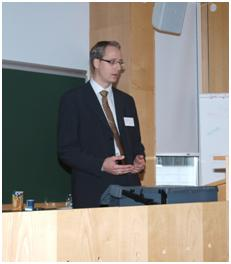
Research seminar in Trondheim on Biofuels was a great success
The Nordic Energy Research funded project “New, innovative pre-treatment of Nordic wood for cost-effective fuel-ethanol production” completed its final project seminar at the Paper and Fibre Research Institute (PFI) in…
The Nordic Energy Research funded project “New, innovative pre-treatment of Nordic wood for cost-effective fuel-ethanol production” completed its final project seminar at the Paper and Fibre Research Institute (PFI) in Trondheim, Norway, on November 3-4, 2010.
Biofuels and chemicals from Nordic forests
The seminar was organized by PFI, in collaboration with INNVENTIA (Sweden), Matis Prokaria (Iceland), SINTEF Materials and Chemistry (Norway) and VTT Technical Research Centre of Finland, all R&D partners in the Nordic project. The seminar attracted a wide audience comprising scientists working in the field of wood processing/biofuel production, representatives from wood processing industry and fuel producers, as well as other parties interested in biofuel production.
The seminar marked the finalization of a 4-year Nordic collaboration in the field of bioethanol production. Presentations by the project partners reported findings from the project on the first day. Presentations on related topics were given by invited speakers on the second day.
A general presentation of the research project, its overall objectives and the central research tasks was given by the project manager, Karin Øyaas (PFI). After this the individual research activities in the project were addressed. The first session focused on the pretreatment of wood raw materials as the central starting point in the bioethanol production process. The work was done using pine or aspen as the wood raw material inputs. Results from steam pretreatment, strong acid pretreatment and pretreatment by soda-cooking, all addressed in the project, were presented by Kai Toven (PFI), Kando Janga (PFI/NTNU) and Anna von Schenk (Innventia).
Chemical/physical changes taking place during pretreatment were reported, and possibilities and limitations of the different pretreatments were discussed. Delignification and lignin separation were central topics in these studies. The pretreated materials produced were further elucidated in enzymatic hydrolysis and/or fermentation trials.
In the second session presentations focusing on enzymatic hydrolysis and fermentation were given. The capabilities of robust microorganisms isolated from Icelandic hot springs were presented by Gudmundur Oli Hreggvidsson. The sequencing of the genomes and metagenomes, as well as the suitability of these organisms both as a source of thermophilic cellulolytic enzymes as well as of thermophilic ethanol producing organisms was discussed.
Pretreated pulps were assessed in hydrolysis and fermentation trials. Nils Dyrset (SINTEF) presented work on enzymatic hydrolysis yields from pretreated pulps with different lignin levels, using commercial enzymes. Ethanol fermentation trials were also presented using both ordinary ethanol producing yeast strains (S. cerevisiae), as well as mutant strains of the thermophilic anaerobic bacteria Thermoanaerobacterium islandicum isolated from Icelandic geothermal areas. Jaana Uusitalo (VTT) presented hydrolysis and fermentation of pretreated materials at high dry matter concentrations, using novel feeding strategies and fermentation setups to minimize unwanted inhibition of the fermenting organisms.
In the third session results from systems analyses of different wood-to-ethanol process setups were presented by Anna von Schenk (INNVENTIA). A study discussing the possible co-localization/integration of an ethanol producing facility with an existing oil refinery was also presented. The second day of the seminar was devoted to presentations by invited speakers. Sune Wännström (Processum, Sweden) discussed the production of biofuels, chemicals and energy from the perspective of the Processum cluster approach. The next presentation, by Martin Lersch (Borregaard, Norway), also focused on the lignocellulosic biorefinery and discussed the new Bali pretreatment process developed by Borregaard. This was followed by a presentation of the Weyland strong acid process and pilot plant for bioethanol production with a patented acid recycling system, given by Jørn Einen (Weyland, Norway).
The possibilities for enzyme recycling by magnetic immobilization could be a future strategy for reducing enzyme costs in bioethanol production processes/biorefineries. This was illustrated and discussed by Timothy John Hobley (DTU, Denmark). New commercial enzymes available in the lignocelluloses-to-bioethanol production process were presented by Johan Börjesson (Novozymes, Denmark). The final presentation was given by Carl Johan Franzen (Chalmers University of Technology, Sweden), focusing on industrial cell factories for conversion of tomorrow’s industrial raw materials (e.g. lignocelluloses).
In addition to interesting presentations both from the research and industry side, the seminar opened for valuable discussions among the participants. The research collaboration established by the carrying out of this Nordic project will be continued in the new project “Sustainable Biofuel: Innovations in Bioethanol Production Technologies” (SusBioFuel), also funded by Nordic Energy research.
- Project owner and coordinator: Paper and Fibre Research Institute AS, PFI (NO)
- R&D partners: Matis ohf (IS), INNVENTIA AB (S), SINTEF (NO), VTT (FI), PFI AS (NO)
- Other partners: Novozymes (DK), SEKAB (S), Norwegian forest owners (NO), StatoilHydro (NO), Norske Skog (NO), Borregaard (NO)
- Project duration: 2007 – 2010.
- Total Budget: 12.7 M NOK (8 M NOK from Nordic Energy Research, 63%)
- Contact information: Karin Øyaas, PFI AS). Phone: (47) 959 36 526. E-mail: karin.oyaas@pfi.no
